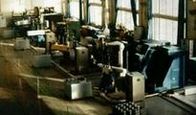The process basis of FMS is group technology. It determines the process according to the group of processing objects, selects the corresponding CNC machining equipment and the storage and transportation system of materials such as workpieces and tools, and is controlled by computer, so it can be automatically adjusted and realized. A batch of efficient production of a variety of workpieces within a certain range (ie, "flexible"), and can change products in time to meet market demand. FMS combines both manufacturing and partial production management functions, so it can comprehensively improve production efficiency. FMS's process range is expanding and can include blank manufacturing, machining, assembly and quality inspection. Most of the FMS put into use in the mid-1980s were used for cutting and also for stamping and welding. The main technical and economic effects of adopting FMS are: the assembly of required parts can be arranged in time according to the needs of assembly operations, and timely production can be realized, thereby reducing the inventory of blanks and work-in-progress, and corresponding liquidity occupation, shortening the production cycle; Improve the utilization rate of equipment, reduce the number of equipment and plant area; reduce direct labor, can achieve continuous "unmanned production" 24 hours a day and night under the conditions of less people; improve product quality consistency. In 1967, the British company Molins developed the "system 24" for the first time based on the basic concept of FMS proposed by Williamson. Its main equipment is six multi-process CNC machine tools with modular structure. The goal is to achieve continuous processing 24 hours a day under unattended conditions, but it was not completed due to economic and technical difficulties. In the same year, White Sunsland Company of the United States built the Omniline I system, which consists of eight machining centers and two multi-axis drilling machines. The workpieces are placed in the fixtures on the pallets and are beaten in a fixed sequence between the machine tools. Transfer and process. This flexible automation device is suitable for use in small-variety, high-volume production, and is similar in form to a conventional automatic production line, so it is also called a flexible automatic line. Japan, the former Soviet Union, Germany, etc. also carried out the development of FMS in the late 1960s and early 1970s. In 1976, Japan's FANUC exhibited a flexible manufacturing unit (FMC) consisting of a machining center and industrial robots, providing an important form of equipment for the development of FMS. The flexible manufacturing unit (FMC) generally consists of 1 to 2 CNC machine tools and material conveying devices. It has an independent workpiece storage station and unit control system. It can automatically load and unload workpieces on the machine tool, and even automatically detect the workpiece, which can realize continuous operation of limited processes. Production, suitable for multi-variety small batch production applications. In the late 1970s, FMS had a great development in both technology and quantity. In the early 1980s, it has entered a practical stage. Among them, FMS consists of 3 to 5 devices, but there are also larger systems. In 1982, Japan FANUC built an automated motor processing workshop consisting of 60 flexible manufacturing units (including 50 industrial robots) and a three-dimensional warehouse. Two other automatic guided trolleys transported blanks and workpieces, in addition to In the unmanned motor assembly shop, they can run continuously for 24 hours. This automated and unmanned workshop is an important step towards an automated factory that implements computer integration. At the same time, there are a number of economic FMSs that only have the basic characteristics of FMS, but the degree of automation is not perfect, which makes the design ideas and technical achievements of FMS popularized. Next page We offer a complete range of BS4504 table flanges for use with OD tube and nominal bore pipe in carbon steel and stainless steel to tables D, E, F, and H. Specials can be manufactured to customers' special requirements. We offer a range of ASA 150LB raised face, weld neck, blind and slip-on flanges in grades A105, Q235 and 304, 316 to ASTM A182 specification. BS4504 Flanges,BS4504 Threaded Flanges,Hub Pipe Flanges,Screwed Flange Shandong Zhongnuo Heavy Industry Co.,Ltd. , https://www.znforged.com
The flexible manufacturing system is composed of a unified information control system, material storage and transportation system and a set of digital control processing equipment. It can adapt to the flexible manufacturing system of the processing object transformation, which is abbreviated as FMS. 